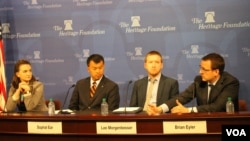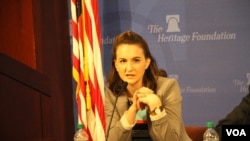International analysts meeting in Washington this week have said that Cambodia’s recent election was not representative of the will of the people following the banning of the country’s main opposition ahead of the vote.
At a meeting on Thursday at the Heritage Foundation, speakers said the newly one-party parliament did not reflect voters’ wishes to see pluralistic democracy in the country.
“It’s not representative of what a multiparty democracy should be. I mean, in a multiparty democracy, you have opposition voices in parliament. You’re allowed to disagree in a multiparty democracy,” Lee Morgenbesser, assistant professor at the Griffith Asia Institute of Griffith University, Australia, told attendees.
The guests at the event said the Cambodian government should reverse its current political agenda and provide more space for opposition voices to be heard in Cambodia’s democratic institutions.
"The Cambodian government, in particular, should give voices, give space, to alternative opposition parties. But, the average person's voice right now, they are completely silent," Olivia Enos, a policy analyst at the Heritage Foundation’s Asian Studies Center, told VOA Khmer.
The new government should work towards more inclusive development, according to Sophal Ear, an associate professor at Occidental College in Los Angeles.
“I would say that the reform should have to do with making the economy more efficient, reducing the amount of corruption,” he said. “If now that you have secured your position and you still can’t imagine somehow losing all the things you have, you should be willing now to dedicate more resources toward frankly the development of the country.”
Civil society groups and ordinary Cambodians should be heard on issues such as inequality and rights, Enos of the Heritage Foundation said.
“But it can really only happen if reforms are undertaken. And, that includes granting voices to civil society that no longer have the space to speak their mind, average Cambodians, and also to the government official.”
Morgenbesser told VOA Khmer that the electoral integrity should be a critical reform for the new government if they want to gain credibility.
“I think they need to reread the recommendations of the international observers that have been offered since 1998 about improving the integrity of an election, especially around things like registration and vote buying," he said.
Enos said the Paris Peace Accord should hold the Cambodian government accountable in accordance with its commitments to pluralist democracy.
“There is no space for opposing voices, little room for freedom of association… for Cambodians to express their view. And, this is unacceptable,” Enos said. “Many signatories to the Paris Peace Agreement back in 1991 committed to actually holding Cambodia accountable if there were democratic backslides.”









